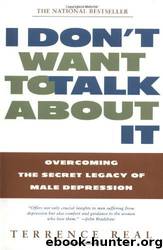I Don't Want to Talk About It: Overcoming the Secret Legacy of Male Depression by Terrence Real

Author:Terrence Real [Real, Terrence]
Language: eng
Format: epub, mobi
ISBN: 9780684835396
Amazon: 0684835398
Publisher: Scribner
Published: 1997-01-02T05:00:00+00:00
CHAPTER NINE
Balance Prevails: Healing the Legacy
Through the mechanism of carried shame and carried feelings, the unresolved pain of previous generations operates in families like an emotional debt. We either face it or we leverage our children with it. When a man stands up to depression, the site of his battle may be inside his own head, but the struggle he wages has repercussions far beyond him. A man who transforms the internalized voice of contempt resists violence lying close to the heart of patriarchy itself. Such a man serves as a breakwall. The waves of pain that may have wreaked havoc across generations spill over him and lose their virulent force—sparing his children. The “difficult repentance” such a man undertakes protects those who follow him. And his healing is a spiritual gift to those who came before. The reclaimed lost boy such a man discovers—the unearthed emotional, creative part of him—may not be merely the child of his own youth, but the lost child of his father’s youth, or even of his father’s father.
Each man is a bridge, spanning in his lifetime all of the images and traditions about masculinity inherited from past generations and bestowing—or inflicting—his own retelling of the tale on those who ensue. Unresolved depression often passes from father to son, despite the father’s best intentions, like a toxic, unacknowledged patrimony. Conversely, when a man transforms the internalized discourse of violence, he does more than relieve his own depression. He breaks the chain, interrupting the path of depression’s transmission to the next generation. Recovery transforms legacies.
When a depressed man has trouble remembering why he should follow “the dark path,” take up the arduous work of recovery, I ask him about his relationship to his father. And then I ask about his own kids.
“Do the work,” I will often say to such a man. “Face this pain, now, or pass it on to your children, just as it was passed on to you.”
Virtually every depressed man I have worked with knows what I am speaking about. Many of the men I treat would never tough out the process of therapy for their own sake. But men have been trained to be good soldiers, and many are willing to experience the pain they have spent lives running from for the sake of their children. I call these men relational heroes. Like the great adventurers of old, they are willing to descend to the depths and encounter their monsters. They want to be better fathers than they had. They want the legacy of physical or psychological violence to stop.
Thirty-five-year-old Jonathan Ballinger, a mechanic and recovering alcoholic, did not remember the fear he had felt as a child raised by two severe love addicts and alcoholics. Jonathan’s parents spent most of their days and nights drinking with each other, fighting with each other, and then making up. Their son and his three sisters were, by and large, left to fend for themselves. Jonathan did not remember his childhood terror until we began working together.
Download
I Don't Want to Talk About It: Overcoming the Secret Legacy of Male Depression by Terrence Real.mobi
This site does not store any files on its server. We only index and link to content provided by other sites. Please contact the content providers to delete copyright contents if any and email us, we'll remove relevant links or contents immediately.
| General | Men |
| Women in History |
Cecilia; Or, Memoirs of an Heiress — Volume 1 by Fanny Burney(32549)
Cecilia; Or, Memoirs of an Heiress — Volume 2 by Fanny Burney(31948)
Cecilia; Or, Memoirs of an Heiress — Volume 3 by Fanny Burney(31932)
The Great Music City by Andrea Baker(31917)
We're Going to Need More Wine by Gabrielle Union(19035)
All the Missing Girls by Megan Miranda(15962)
Pimp by Iceberg Slim(14489)
Bombshells: Glamour Girls of a Lifetime by Sullivan Steve(14058)
For the Love of Europe by Rick Steves(13948)
Talking to Strangers by Malcolm Gladwell(13350)
Norse Mythology by Gaiman Neil(13349)
Fifty Shades Freed by E L James(13233)
Mindhunter: Inside the FBI's Elite Serial Crime Unit by John E. Douglas & Mark Olshaker(9324)
Crazy Rich Asians by Kevin Kwan(9280)
The Lost Art of Listening by Michael P. Nichols(7494)
Enlightenment Now: The Case for Reason, Science, Humanism, and Progress by Steven Pinker(7306)
The Four Agreements by Don Miguel Ruiz(6745)
Bad Blood by John Carreyrou(6612)
Weapons of Math Destruction by Cathy O'Neil(6267)
